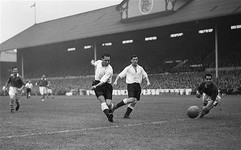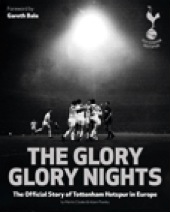 Going into the 1958/59 season Anderson had done well with two high placed finishes but Tottenham still could not be classed as a great team. At times they could be excellent but at others like too many of the players they struggled to find their form. The defence carried an air of uncertainly. The Blanchflower / Harmer midfield combination had worked well but there was a feeling that the forwards were not responding as well as they could. Anderson had worked hard to resolve these issues but the strain was telling on him. Lets not forget he was in his sixties when he took over as manager. A number of the players had been in Sweden for the World Cup during the summer and again maybe they were not fully recovered from the previous seasons toils. Whatever the reasons the new season, like the last, did not start well. Blackpool opened the season and took home the points after winning 2-3. Midweek saw us lose again this time at Chelsea 2-4. Worse still Ditchburn (1) broke his finger and the goalkeeper’s career at Spurs was over. Then on the second Saturday we went to Blackburn and were thrashed 0-5. Midweek again and Chelsea visited us and we got off the mark with a 4-0 win, Terry Medwin registering a hat trick and George Robb hitting the other. Any thought of corners turned disappeared at the weekend and we lost 1-3 at home to Newcastle. On top of that the visitors missed two penalties and several open goals in the first half. According to supporters at the time Iley and Blanchflower never gelled as a pair at wing half and they would leave gaps exposing the defence. One point from the next two away games and then the second win, 1-0 at home to Forest. Fred Sharpe coming in for Blanchflower scored on his debut (he only played two games) and the last player given his bow by Anderson. The trip to Manchester United produce d a 2-2 draw. This was followed by a win at home to Wolves. These two teams would occupy the top two places at the season end. Anderson’s final game was at Portsmouth and ended in a 1-1 draw. The last goal in the era coming from Alfie Stokes, pictured top. The following weekend would see a new manager in charge.
Anderson’s health finally gave out and after fifty years service to Tottenham he resigned. A number of observers have suggested that the Board knew Anderson would only be a stop-gap measure, holding the fort until Nicholson was ready, especially considering Anderson’s age. Described by all that knew him as a cheerful, popular friendly man maybe it came to late for him. Certainly Phil Soar in the official history thinks so and this view is supported by Terry Dyson in his autobiography. By that point Bill Nicholson was already building a reputation as a young coach having gained his badges and had spent the summer working with the England team at the World Cup. Ron Burgess one of the all time greats at the club recalls that he was about to return to South Wales having been rejected by the club when he was asked to play in a reserve game. Afterwards Jimmy persuaded him to join the nursery side at Northfleet where he spent one season before returning to Spurs. Ron said Jimmy was like a father to the lads and nothing was too much trouble for him and this helped a number of the players develop into first team players. In addition to the roles he filled for the club described in part one Jimmy served in the Royal Horse Artillery during World War One. At various times he covered for the Joe Hulme when he was ill as well as Arthur Rowe as well as being a main support during World War Two when Arthur Turner took over as the manager. As well as the players he brought in he had developed Baker and Henry through the ranks and signed Dyson whilst he was in the army. Seven of the eleven major players that would deliver the Double were at the club when he stepped down. He also delivered a FA Cup semi-final and two top three finishes in three complete seasons. We started by saying that his time in charge split opinions. He may have left a lot of the coaching to Nicholson but Anderson was a great servant to the club and I don’t think history should look too unkindly upon him. Jimmy passed away in 1970. What came next, the October 1958 to August 1960 period and there was still some plenty of wobbles on the way to the Glory days. The forthcoming Prelude mini -series will explore that period. COYS Keith Harrison. t- Keith 16024542 f- peter shearman (old non de plume) View Full Bio Top image - George Robb fires home V Middlesbourgh in a game from 1953 before Anderson ttok over. Notes -1- Ted Ditchburn will be featured in Hotspur Towers later.
2 Comments
Alok
25/11/2015 12:14:28 pm
Thanks once again for putting the whole of Anderson era. Its through your articles that we live the history of Spurs,
Reply
keith
6/3/2017 01:44:40 pm
pls note links to rest of series are
Reply
Leave a Reply. |
Features
Flying Down to Rio History of T.H.F.C. Tribute to Bill Nicholson Talking Tottenham Early Legends The Road to Turin International Connections Hotspur Towers Most Read Articles
The 100 Year War Interview with Marina Sirtis A Long Dark Shadow By Royal Appointment School Report: An Insight into the Younger Eric Dier Dear Jimmy All Change At Spurs Hotspur Towers History Of THFC: Part 1 Passage to India: Rohan Rickets Thanks For The Memories Our Tommy Carroll The AVB Files: Part1 The Lilywhites You The Jury The Hand Of Hugo Connection - Argentina Creating a Reputation One Hotspur Archives
August 2018
Categories
All
|
 RSS Feed
RSS Feed

